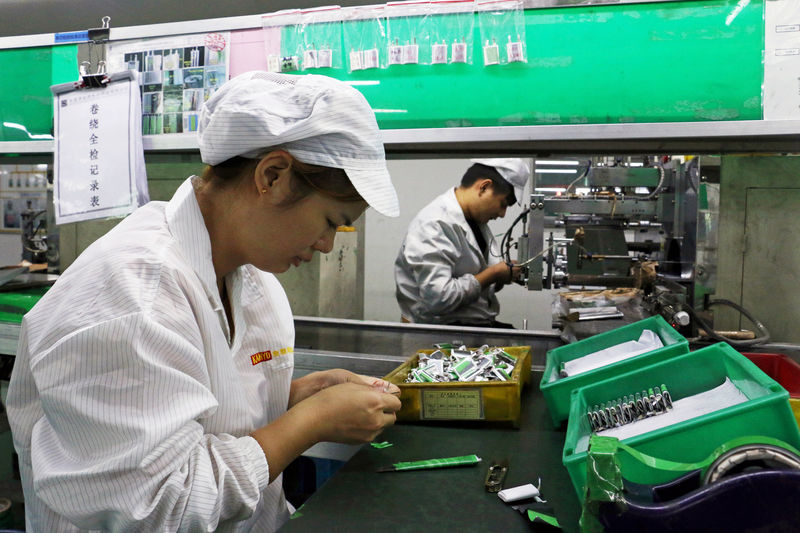BEIJING (Reuters) - Profits at China's industrial firms grew in March, rebounding from four months of contraction, adding to optimism the world's second-largest economy may be starting to stabilize.
A return to profits could add to the debate over how much more stimulus Beijing needs to pump into the economy if it is on the mend.
Beijing and Washington appear to be edging toward a trade deal, but investors are concerned that a sharp slowdown in China will have repercussions on the wider global economy.
Profits in March rose 13.9 percent year-on-year to 589.52 billion yuan ($87.62 billion), the National Bureau of Statistics (NBS) said on its website on Saturday, recovering from a 14 percent fall in the first two months.
That marked the biggest monthly increase since July 2018.
For the first quarter of the year, profits notched up by industrial companies dropped 3.3 percent to 1.3 trillion yuan compared with a year earlier, according to the NBS.
The growth in March mainly came from an acceleration in production and sales, as well as a recovery of profits in key industrial sectors, Zhu Hong of the statistics bureau said in a statement accompanying the data.
The pick-up in industrial profits eased concerns about the slowing momentum in China's economy as it has been cooling for the past year, weighed down by a bitter trade dispute with the United States, as well as a campaign to curb debt risks that has led to higher financing costs for companies.
The government has ramped up stimulus measures this year, announcing billions of dollars in additional tax cuts and infrastructure spending. Growth in China's industrial output increased at the fastest pace since July 2014 in March, while gross domestic product grew 6.4 percent, beating expectations.
Producer prices, in the meantime, also picked up for the first time in nine months in March, lifted by higher global commodity prices and government efforts to boost domestic demand.
However, there are still concerns about whether the turnarounds will be sustainable, as gains could have been due to seasonal factors - such as the resumption in constructions after the Lunar New Year - instead of a rebound in broader demand.
Most of China's major steel makers logged smaller earnings in the first quarter due to higher raw material prices and weak demand.
The country's largest listed steel firm Baoshan Iron & Steel Co Ltd posted its first negative growth since 2015 on Wednesday. Jiangsu Shagang Co Ltd, China's biggest private-owned steel mill, reported a 60.62 percent decrease in its Q1 net profit too.
Upstream sectors such as mining and metal producers and state-owned firms still dominated the biggest share of profit gains. Profits for oil and natural gas extraction rose 10.3 percent in the first versus a 5.7 percent decline in the January-February period.
Profits at China's state-owned industrial firms, however, declined 13.4 percent on an annual basis for the first quarter, according to the statistics bureau.
Liabilities of industrial firms rose 6.5 percent year-on-year as of end-March, the NBS said.
The data includes companies with annual revenues of more than 20 million yuan from their main operations.
